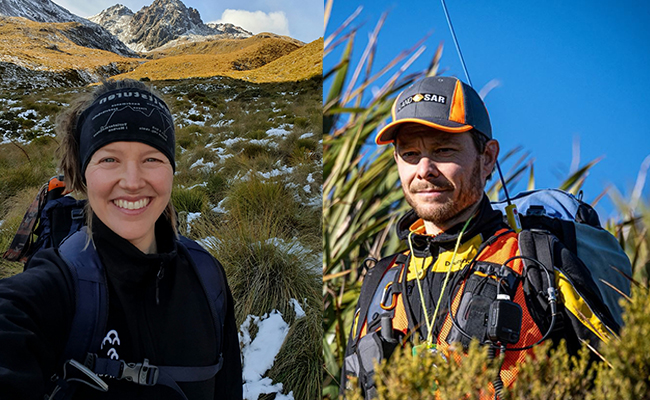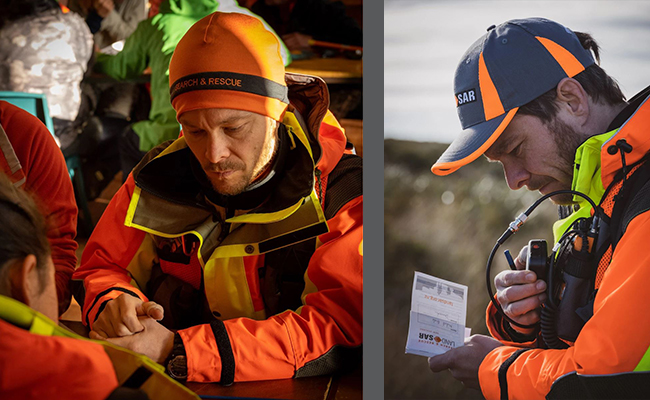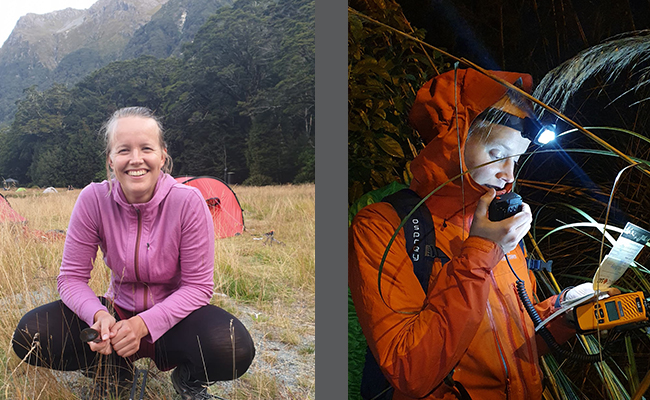
Physiology colleagues Aline Boer (left) and Michel Herde are two of the several Land Search and Rescue volunteers from Otago. Michel Herde image courtesy Brent Hollow.
There's a special sense of solidarity that comes with being part of a team that is tasked with rescuing someone lost in the outdoors.
More so, when you're doing this not as your job, but as a volunteer sharing your specialist skills.
For self-confessed adrenaline junkie and Centre for Neuroendocrinology Lab Coordinator Michel Herde, becoming a field team volunteer with Land Search and Rescue (LandSAR) brought together two enduring passions – for the outdoors and for helping the community.
“I've always been an avid tramper and being a field volunteer gave me the opportunity to use my skills for a greater purpose.”
Herde recalls a recent rescue mission where a hiker needed assistance after spending all day walking a trail and being unable to complete it due to exhaustion.
“In this instance we were lucky that the hiker was able to get reception and call the police, since they were not equipped to spend the night outdoors and could have been at risk of hypothermia if not rescued.”

As a LandSAR volunteer you are backed by rigorous training and a supportive team, says Michel Herde, a volunteer of three years and secretary of the Dunedin group. Images courtesy Brent Hollow.
In the three years he's been with LandSAR, Herde has been on a number of search and rescue missions, and not all of them in the wilderness.
“We operate in urban areas too and have been called out to help search for missing persons with cognitive impairments.”
He is the secretary of the local Dunedin group, which numbers around 60-70 volunteers.
“Not all our volunteers are outdoors focused. We have volunteers that do administration and incident management too.”
While a field volunteer would need to be fit enough to carry supplies and equipment for eight hours across mixed terrain, those assisting with incident management would benefit from IT or communications skills says Herde.
“We welcome volunteers from all kinds of backgrounds. Volunteers are provided training and there is ample support within the teams.”
Physiology Research Fellow Aline Boer says volunteering for search and rescue was something she 'always wanted to do'.
“Coming to a new city by myself, LandSAR volunteering gave me an opportunity to connect with like-minded people and see more of Aotearoa's wonderful outdoors.”

LandSAR was a natural fit for an outdoorsy person like herself says Aline Boer. She is looking forward to completing her training and supporting the team out in the field.
She is currently training as a field volunteer, learning about search techniques, outdoor first aid, and track and clue awareness. Learning these skills, she says is a “source of comfort”.
“As someone who spends a lot of time outdoors, I am comforted knowing that I have the skills to help myself or my friends if we are ever in a sticky situation.”
That in itself is a great reason to volunteer says Boer.
“And if after a training session or two you find that this is not for you, it's ok to step back. As volunteers, there are no strings attached to our participating.”
While Boer is looking forward to completing her training and getting out in the field, she is hoping to put her climbing experience to use and join the local group's cliff rescue team.
For Herde, it's the connections that count.
He's met people from all walks of life at LandSAR, saying it's a great way for “an out-of-towner to befriend the locals”.
“Builders, nurses, police officers, naturopaths, doctors, and more volunteer with us. There's a great sense of trust among the team and you develop some lasting friendships that go beyond volunteering.”
Keen to find out more?
Off-Campus profiles the diverse and inspiring out-of-office pursuits of Otago staff. Do you know somebody we can profile for Off-Campus? Email us.
~ Kōrero by Sandra French, Internal Communications Adviser